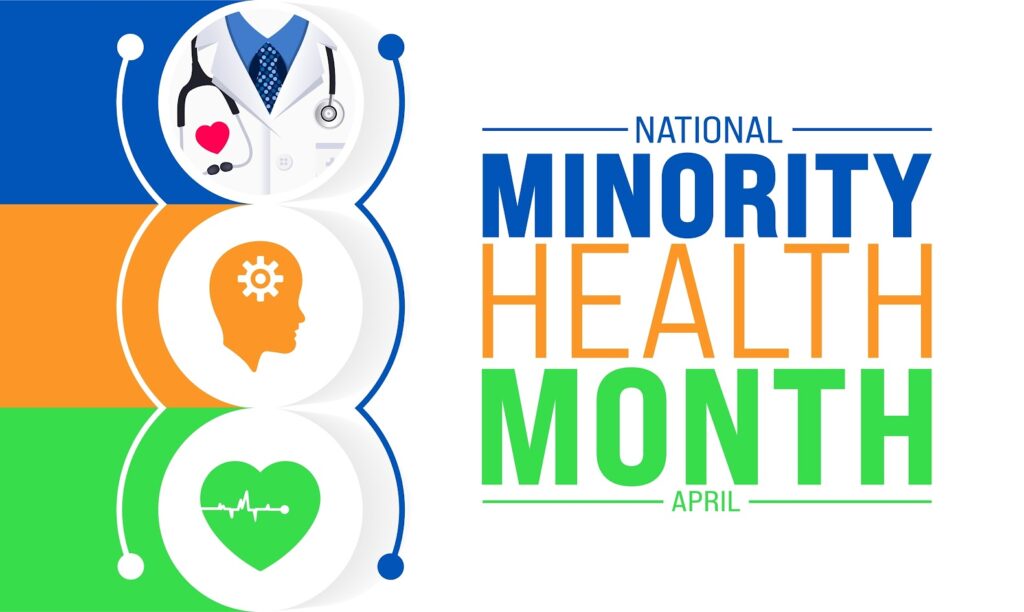April marks not only the blossoming of spring and the onslaught of my allergies but also a pivotal moment for raising awareness and advocating for equitable healthcare access.
National Minority Health Month, observed annually throughout April, serves to emphasize the recognition of the unique health challenges faced by minority communities. This month-long observance is not just a symbolic gesture; it’s a critical opportunity to take a deeper dive to open up dialogue and cast our focus on disparities, promote health equity and catalyze meaningful change.
In 1914, Booker T. Washington, an American educator, author and orator, stated, “Without health, and until we reduce the high death rate, it will be impossible for us to have permanent success in business, in property getting, in acquiring education, or to show other evidence of progress.” He launched the National Health Improvement Week in 1915, later known as National Negro Health Week (NNHW). In the early 20th century, much of the Black population lived in poverty and was concentrated in the rural South. Formal health care was often nonexistent, sanitation was poor, nutrition was inadequate and housing was substandard.
The theme of National Minority Health Month 2024, Be the Source for Better Health: Improving Health Outcomes Through Our Cultures, Communities and Connections, is about understanding how the unique environments, cultures, histories and circumstances (known as social determinants of health, or SDOH) of racial and ethnic minority and American Indian/Alaska Native (AI/AN) populations impact their overall health.
In my country, Canada, according to the Government of Canada’s website “Social, economic and political factors shape the conditions in which individuals grow, live, work and age, and are vitally important for health and wellbeing. When these inequalities are systematic, unfair and avoidable, they can be considered inequitable. In other words, health inequities are not simply numerical differences between the health outcomes of different groups: they are unjust differences that could be eliminated or reduced by collective action and the right mix of public policies.” It also states, “At the moment, a complete portrait of the health of Black Canadians does not exist because of substantial data gaps.”
We all need to close the gap.
Related: Addressing Breast Cancer Health Disparities
How National Minority Health Month Helps Drive Change
National Minority Health Month 2024 is an opportunity to expand the knowledge base of research on minority health and health inequalities through a number of mechanisms, such as research and education collaborations, training programs and outreach initiatives.
There is a need for more research program support and clinical trials. The study of many aspects of minority health and health disparities, as well as research on health systems, workforce development and environmental justice, is desperately needed.
It is essential to enhance the research capacity and infrastructure dedicated to minority health and health disparities at institutions that are strategically positioned to serve communities affected by these disparities. This effort should also focus on improving the recruitment and retention of individuals from populations underrepresented in the scientific workforce. Additionally, we must prioritize training in the field of minority health and health disparities research to further these goals.
There is an urgent need to engage scientists with communities to ensure structured involvement in research on minority health and health disparities. Concurrently, we must strengthen institutional efforts to support individuals from groups that are underrepresented in the scientific workforce. Here’s how we can drive change and increase participation:
Acknowledging Disparities
National Minority Health Month highlights the stark disparities in healthcare outcomes among minority populations. From higher rates of chronic diseases such as diabetes, hypertension and sickle cell to disparities in access to quality care and cultural barriers that hinder healthcare engagement, minority communities face distinct challenges that contribute to health inequities.
Promoting Awareness and Education
By dedicating an entire month to minority health, we create space for important conversations, educational initiatives and community outreach efforts. From health fairs and workshops to online campaigns and social media discussions, National Minority Health Month provides platforms for raising awareness about prevalent health issues, sharing resources and empowering individuals to take charge of their health.
Fostering Collaboration and Advocacy
National Minority Health Month serves as a rallying point for stakeholders across sectors to come together in pursuit of health equity. Healthcare providers, community organizations policymakers, and advocates collaborate to address the root causes of health disparities, advocate for policy changes and champion initiatives that promote culturally competent care and inclusive health services.
Empowering Minority Communities
At its core, National Minority Health Month is about empowerment — empowering minority communities to demand equitable access to healthcare, empowering healthcare providers to deliver culturally competent care and empowering policymakers to enact meaningful reforms. By amplifying the voices of those most affected by health disparities, we can drive systemic change and create a healthcare system that works for everyone.
Driving Policy Change
National Minority Health Month serves as a catalyst for policy change at the local, state and national levels. By shining a spotlight on health disparities and inequities, advocates can mobilize support for policies that address social determinants of health, expand access to affordable healthcare coverage and invest in community-based solutions that prioritize the needs of minority populations.
Looking Towards the Future
As we commemorate National Minority Health Month each April, we must also look toward the future with hope and determination. While the road to health equity may be long and challenging, it is a journey worth embarking on. By recognizing the importance of diversity, equity and inclusion in healthcare, we can build a healthier, more equitable future for all.
National Minority Health Month is not just a month on the calendar; it’s a call to action, a reminder of the work that remains to be done and a celebration of the resilience and strength of minority communities. By recognizing and addressing health disparities, promoting awareness and education, fostering collaboration, empowering communities and driving policy change, we can move closer to achieving health equity for all.












Join or login to leave a comment
JOIN LOGIN